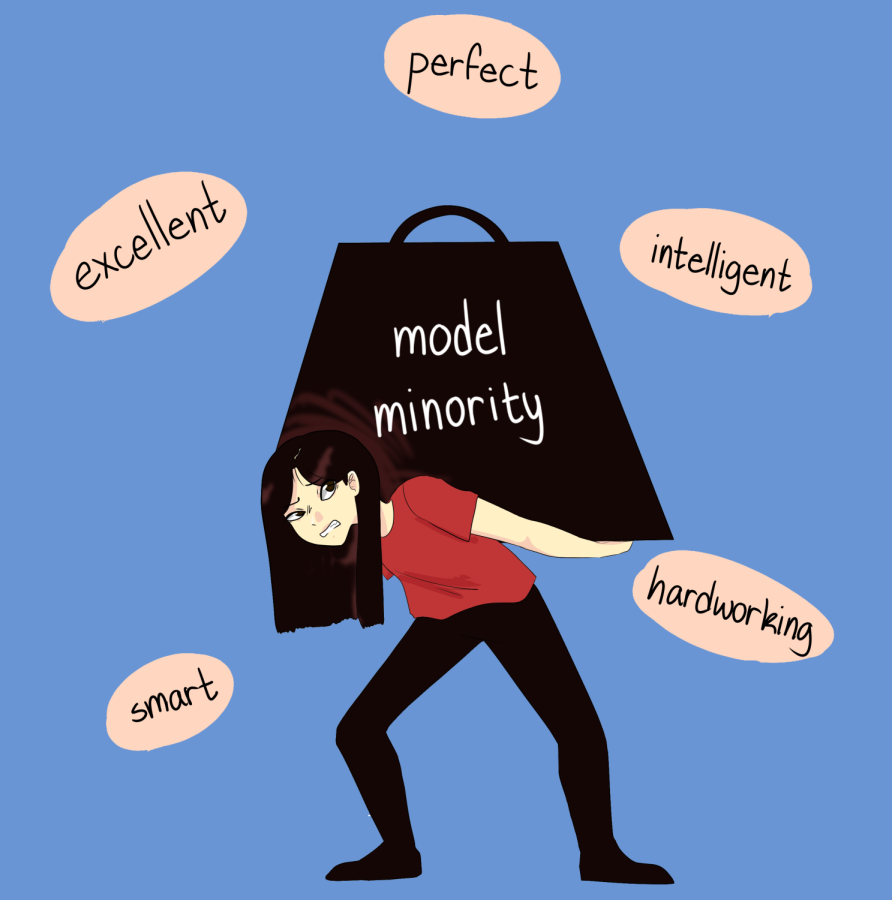Opinion | Model minority myth minimizes Asian American experiences
April 26, 2022
The model minority myth is a misconceived narrative that characterizes all Asian Americans as intelligent, industrious and obedient people. The stereotype falsely suggests Asian Americans exemplify the so-called “American dream” and hails the group as living proof that hard work alone is sufficient for success and acceptance.
While the traits associated with the myth are seemingly positive, in reality, its destructive effects are multifold.
The term “Asian American” itself was first publicly coined in 1968 by activists Emma Gee and Yuji Ichioka as a way to build a coalition and unite in the fight for greater equality. However, the use of such an umbrella term is a double-edged sword.
On the one hand, it is a way to find solidarity and acknowledge shared experiences. My identification as Asian American is distinct from my Japanese and Chinese ethnic background.
While I embrace the latter aspects of my identity separately, being a proud Asian American has allowed me to connect and share with others whose ethnicities are not necessarily the same as my own.
Get The Daily Illini in your inbox!
On the other hand, the term can also play into generalizations and present the group as a monolith. Over the years, I have personally heard variations of the joke that “all Asians are the same” countless times.
This statement could not be further from the truth. The categorization encompasses over 20 ethnicities and is comprised of a diverse set of people. Yet, stereotypes are taken and applied universally across Asian Americans.
The model minority myth, which has now been repeated for over 50 years, is among the most pervasive.
In a 2021 survey by the nonprofit Leading Asian Americans to Unite for Change, respondents were asked to list three adjectives to describe Asian Americans. As a whole, 19.4% of Americans answered “intelligent” or “smart” while 9.3% answered “hardworking.” Among Asian Americans, 19.3% answered “intelligent” or “smart” and 13.3% answered “hardworking.”
This consistency illustrates that the stereotypical views aligned with the myth are not only external, but are also internalized within the Asian American community itself. The demand to fit such a narrow standard is an unreasonable ask.
The fact that the stereotypes are masked as compliments or praise makes the myth that much more insidious. Experiences that deviate from the expectation are then erased or invalidated as failures. Thus, the fear of being anything but perfect can manifest in extreme responses.
I recently had the opportunity to speak on the local NPR station along with erin Khuê Ninh, associate professor in the Department of Asian American Studies at the University of California, Santa Barbara and author of “Passing for Perfect: College Imposters and Other Model Minorities” about the relationship between the concept of the model minority and the pressure to be perfect.
In both her book and the segment, Ninh highlights the issue through the examination of outliers. She dives into case studies of college imposters who were so overwhelmed by their need to succeed that they resorted to drastic measures.
Azia Kim impersonated a Stanford freshman, going so far as to live on campus and attend classes. Jennifer Pan hired a hitman to kill her parents after they discovered that she had never received a high school diploma.
Through these heartbreaking stories, Ninh explores systemic reasons to explain the actions of individuals. She argues that demands to meet the model minority standard are embedded into the Asian American identity and played a large role in the making of such illogical decisions.
This tendency still rings true in less extreme situations. Despite receiving extensive familial support and being taught by my parents that failure is not only okay but also encouraged, my own inability to accept anything less than “perfection” has only grown.
A combination of external expectations tied to stereotypes about my identity and my internalization of them contributes to extreme feelings of dread, fear and worry. Such feelings persist even when I know where they are coming from and can rationally conclude that “failure” is not as ruinous as it appears.
Understanding the difficulties of facing demands of perfection among Asian Americans requires recognition of the persisting effects of being viewed as a model minority.
The model minority is not a myth in the sense that it is not real; the consequences of perpetuating it are tangible and damaging. What makes the notion of the model minority a myth is its disregard for individual experiences. The oversimplified and generalized statements contained in the myth fail to capture the reality of a complex and diverse set of people.
The classification of Asian Americans is extremely broad, and while we can find solidarity based on shared experiences within the group, it is just as if not more important to consider and validate individual experiences as well. Dismantling the myth calls for the acknowledgment of both shared and individual experiences so we can tell the whole story — not just a misrepresented sliver of it.
Rayna is a sophomore in LAS.







